#i have been able to avoid the how at least
Text
♡ Girl Under You ♡



♡ Pairings: gynecologist!seonghwa! x chubby!afab!reader
♡ Genre: smut/fluff
♡ Summary: Scheduling your yearly check up with your OBGYN can be nerve-wracking. Especially when your doctor's Park Seonghwa. Finally getting up the courage to visit, you do all you can to conceal the not so appropriate feelings you have towards him. Not only is it inappropriate but he surely doesn't feel the same. Right?
♡ Word Count: 3.2k-ish

♡ Warnings: reader has a vagina and identifies as a woman. we're at the OBGYN so this is ultra vagina city. pervy Dr. Park Seonghwa, you too are a perv tbh it's mutual, shy/touch starved reader, body worship, nipple/breast play, fingering (gentle & rough), unprotected sex, cum marking, pet names (sweetheart, good girl, baby, etc), a lil rough sex, oral sex (f receiving), nonsexual use of the word slut (not in a bad way), it gets bitey for a second, examination kink, soft dom Hwa vibes.
♡ A/N: Listen, I can explain. It's all on @anyamaris for encouraging me to begin with. Blame her!
Important note: If you have a vagina go get it checked out regularly. Your doctor will certainly not be Seonghwa dicking you down BUT it's an important and sometimes life saving appointment sooo make it or I'll fight you. K, love you, bye ♡

♡ ♡ ♡ “I wanna be that guy. I'll wreck you right up, guy. I'll lie down face up, guy. The girl under you, guy.” ~ Lady Gaga ~ ♡♡ ♡

“Date of your last period? Any abnormal cramping or bleeding? Any chance of pregnancy?” the nurse fires off questions, tapping your answers into the laptop balanced on her hip.
Sitting on the exam table, your feet dangling off the edge, you try not to get whiplash from how quickly she whirls around the room loading a tray with supplies for your exam. The office is unexpectedly short staffed today, forcing her to play the role of nurse and human octopus. You understand how overwhelmed she must be but pray that she stops soon. Your anxiety was already bad enough coming in here. This nervous energy is not helping.
“Last question, honey” she says, turning to face you, “Oh, have you been sexually active recently?” She cracks a playful smile, clearly expecting your answer to be something that it isn’t.
“No” you mumble, avoiding eye contact. Look at how shiny those tile floors are. Has this exam table always been this cushy? Such a marvelous generic art print that is hanging by the door.
The nurse’s eyes widen, a hand clutched to her chest in shock, “You went to Coachella and didn’t get laid?”
“Nurse Kim! Can we not today?” you pout, in no mood to have this conversation right now.
Being a longtime patient here has a lot of perks. Getting closer to the nurses especially has been great for you. I mean, who doesn’t like getting the appointment slot they want every single time? But the drawback is that they like you enough to pick on you. Maybe it’s their way of breaking you out of your shell, getting you to be less shy, but you wish they wouldn’t.
Nurse Kim shrugs, miming the zipping of her lips, “Okay, okay. I’ll mind my business.” Placing the supplies on the table, she grabs you a fresh hospital blue medical gown. “You know the deal, right? No shoes, no bra…”
You nod along with her instructions, hopping down to kick your sneakers off. Finally she finishes and heads for the door to give you some privacy. “The doctor will be in shortly. Let me know if you need anything” she says, stopping halfway out the door. “You really didn’t bang anyone at Coachella. Wow. Girl, you’ve got to learn to live a little. You’re too hot not to slut it up!”
“Thank you so much for everything. Goodbye. Bye!” you laugh, inching the door shut until she’s on the other side of it.
Alone at last, you’re able to get out of your clothes and into your gown in peace and quiet. Well, “peace” might not be the word to describe what you’re feeling but at least you’re able to panic in silence.
You really shouldn’t be as nervous as you are. You’ve been coming to this office for years. Everyone’s kind and welcoming. They always make sure you’re comfortable and taken care of. There’s definitely no part of you they haven’t seen so you have nothing to be ashamed of. Still there’s one thing—one major, heart pounding, pulse quickening thing—that makes you too nervous to function every time you’re here.
Your phone vibrates in your purse and you contemplate not answering but dig it out anyway figuring a little distraction can’t hurt. Unlocking your phone, you spot a text from your best friend.
It reads: “Did you see Hot Doctor yet?”
You giggle to yourself, typing back to her. “His name’s Seonghwa and not yet. Still waiting.”
“On a first name basis are we? Seonghwa. That’s even hot to say.”
“Dr. Park, I mean. His name is hot to say though. He’s hot. I fucking hate it.”
“Just give him your number already!”
“Sure. While he’s swabbing me I’ll be all ‘Hey, Dr. Park. Wanna go to lunch?’”
Your best friend responds with a meme of Megan thee Stallion sticking her tongue out. “Plot twist. The lunch is between my legs, daddy!”
You’re choking back laughter and tears, scrolling your phone for the perfect meme to send back when there’s a knock at the door. You nearly jump out of your skin, shoving your phone back into your purse.
“Come in!” you shout, returning to the exam table just in time for the doctor to step in.
Everything moves in slow motion when Park Seonghwa enters the room. Ahem, Dr. Park. He is, as you and your best friend have come to call him, a hot doctor. The hottest doctor you’ve ever seen. His dark wavy hair’s pulled back into a high ponytail, loose pieces hanging to frame a face too gorgeous to look directly at. His bone structure’s immaculate, his lips soft and pink, and his voice…
“Long time no see. How’s my favorite patient been?” he says, flashing that killer smile of his. That voice. That smile. It makes you want to faint.
You laugh it off, hoping not to come off as flustered as you are. “Dr. Park, I’m not your favorite patient.”
Seonghwa takes a seat on a nearby rolling stool and spins his way over to you, making a cute woo noise when he does. It gets a giggle out of you which is exactly what he wanted.
“Who says you aren’t?” he asks, sliding in closer, his hands disappearing behind your legs.
It’s hard to breathe when he’s this close, staring up at you from between your legs. The smell of his cologne dances around you, a sweet woodsy scent that you imagine might smell even better on top of you. Just the thought awakens a familiar tingle between your thighs that threatens to make you wet the crinkly paper blanket beneath you if you carry on like this. You know that you shouldn’t feel this way. He’s a doctor. He’s just doing his job. And here you are perving over him.
“Dr. Park, anything else you need me to grab?” Nurse Kim asks, popping back into the room. Her appearance snaps you out of your trance and you force a smile to keep things normal. If you weren’t brain rotted and horny you'd swear Seonghwa had been reading your reaction that whole time. That he saw the effect he had on you and seemed somehow amused by it. But that’s factually insane. Get it together.
The foot rests behind your legs, the reason Seonghwa reached back there to begin with, unfold with a creak. “No, I think we’re good” he answers before turning back to you, “Lay back for me and put your feet up. We’ll be done in no time, okay?” You follow his instructions, laying back on the table, readjusting yourself however he asks you to.
Closing your eyes, you rest your hands on your belly, impatiently waiting for this to be over. Though Seonghwa’s interest in what’s between your legs is purely medical, the fact remains that you hope he doesn’t find it ugly. You shaved for this, used this nice pH balancing rose water soap on it. You did everything but put makeup on it and throw it in a dress. You feel kinda silly now thinking back on it but your brain isn’t exactly logical when it comes to him.
A few cranks of a speculum and cotton swabs later you’re done with the first part of your exam. “Good girl, you did well. The hardest part’s over” he praises, swapping his latex gloves out for a new pair. Your heart skips a beat at being called a “good girl”. He didn’t mean it that way but your body can’t differentiate between reality and how devastatingly sexy that was. Seonghwa turns to address the nurse and you quickly press your thighs together for some relief.
“I’ll send these off and go set up for the next patient” Nurse Kim says, grabbing your samples. She turns to smile at you one last time before disappearing from the room. “Remember what I said” she whispers, “Slut. It. Up.” Unfortunately, of all the things she’s skilled at whispering isn’t one of them and Seonghwa hears her.
Rising from his seat, he walks alongside you, stopping when he reaches your chest. “Just lower your gown for me for a second.”
You do as you’re told, carefully rolling your gown below your breasts. “So, slut it up, huh? What’s that about?” he teases, cold hands cupping one of your soft breasts. You inhale sharply at the contact, a thankfully normal reaction to cold hands touching you. Though for you it’s more that they’re his hands than anything.
“She thinks I need to get laid” you blurt out, caught off guard by your own bluntness.
Seonghwa raises an eyebrow, his fingertips pushing gently into your breast. “I’ll have to talk to her about that. She shouldn’t be judging people for their life choices.”
“I mean, it’s not really a life choice. I’m just not…I’m not a girl who…” you ramble, shutting yourself up immediately after realizing what you’re saying. Seonghwa pauses, glancing over at you, two fingers circling the perimeter of your nipple. It stiffens at the closeness, your touch starved body grateful for the attention.
“Not a girl who what?” Seonghwa asks, genuinely interested.
It doesn’t seem that he’ll keep going if you don’t answer so you give in. “I don’t know, guys just don’t hit on me I guess. I’m not that girl.”
Seonghwa continues his examination, flattening his fingers at the base of your breast and dragging them up to your nipple. They bounce back each time, looking rounder and fuller as if he’s worked some magic on them.
“I don’t think that’s necessarily it” he sighs, moving on to the other breast, “A lot of men are intimidated by beautiful women.”
Beautiful women? Did Park Seonghwa just call you a “beautiful woman”?
“B-beautiful?” you stutter, at a loss for what to do with yourself, “That’s really nice of you but I’m not…”
Seonghwa can’t help but smile at how adorable you are when he compliments you. You’re as good at concealing it as Nurse Kim is at whispering. Seonghwa knows that you’re attracted to him. To be fair, a lot of his patients are, but you are truthfully his favorite. Always so beautiful, always so easy to tease, and such a pretty pretty pussy that’s always wet for him.
“But you are” he insists, both hands cradling your breast, thumbs running up the side, “You must have a mirror at home, no?”
“Dr. Park, are you trying to make me blush?” you ask, propping yourself up on your elbows.
The pads of his thumbs graze your hardening nipple and your back arches, a whimper lighter than air escaping your lips. You catch Seonghwa quickly nibbling at his bottom lip, his eyes glimmering at the shock and pleasure painting your face. You caught him. You saw it this time. Really saw it.
Seonghwa knows he should stop here, end the examination, and send you on your way before he does something stupid. It’s just…that little moan you let out? It’s a melody he’s been fantasizing about since the first time you laid across his table. He has to hear it again.
“I don’t know. Is it, aaah…” he breathes in, one of his thumbs circling the tip of your bud, “Is it working?”
Slipping his left hand back across your chest, he palms your other breast, pinching your sensitive nipple each time he rolls his wrist.
“Yes, it…oh god…it’s working” you mewl, your mouth falling open, moans pouring out at the perfect volume for only the two of you to hear.
Your feet tremble in the foot rests, your legs still spread to leave your dripping, vulnerable pussy exposed to the cool air of the room. Hypnotized by the sight of Seonghwa playing with your tits, high off the electric current it sends through your body, it’s easy to forget that you actually came here for a reason.
“I should probably finish your exam” Seonghwa whispers, doing his best to ignore the hard cock pressing against his slacks. Your body may be tempting but it is technically his job to make sure you’re healthy too. His hands gradually cease their movement, gliding down to do away with the gown that was hardly hiding to your naked body.
“Fuck, look at you” he gasps, massaging your squishy belly, tracing your love handles, and rounding the curve of your hip to reach your thigh. His fingers dig into your thigh, savoring their softness all the way up to your core.
His gaze travels back up your body to those starry doe eyes that hang on his every move, “Think I’ll need the lube or are you already wet enough for me, baby?”
Seonghwa rubs two fingers along your slit, collecting your arousal on the tip of his glove. He brings them to his mouth, extending his long tongue to lick your juices up.
“Mmm, you have no idea how long I’ve wanted to taste you” he hums, taking his time to enjoy the taste of you on his tongue.
“Dr. Park, please…” you beg, thighs pressing together again, the need for his touch unbearable.
“Oh, I’m sorry, sweetheart” he apologizes, his fingers immediately returning to their place between your legs. “You want me to finger that perfect little cunt?”
“Yes, please, I want…need it so bad.”
Seonghwa brings his lips to yours, your eyes gleaming with lust as they meet, “You need it, baby? That bad, huh?”
Two gloved fingers push into you, your pussy welcoming them with the tightest of hugs. “Fuck, yes, so good” you whine into his mouth as you begin to ride his fingers. Seonghwa dips his tongue between your lips, your mouths passionately crashing together. You grab the collar of his white coat, drawing him closer to deepen the kiss as his fingers work your core. Inside of you his fingers stimulate spots men who aren’t in his line of work wouldn’t even know existed. Some you didn’t even know could bring you such pleasure until now.
Your eyes squeeze shut, elbows giving out from under you, “Harder, Dr. Park, wanna feel you so deep.”
Seonghwa catches your head before it can hit the cushion beneath you, lowering it down carefully as he draws another kiss from your lips. “Only if you promise to be a good girl and be quiet for me.”
“I p-promise. Quiet. I’ll be…” you moan, throwing your hands over your mouth when he suddenly picks up the pace. Shifting between your legs, he tucks a hand behind your right knee and pushes it to your chest. Your palms are sweating, fingers locked together to keep you from screaming. Seonghwa’s fingers are much deeper than you thought they could go and his pace is too unforgiving for you to brace yourself for any of it.
“Ssh, ssh, you’re getting too loud, baby” he teases, coming in to kiss your inner thigh. Your juices stream down his fingers, soaking the thin paper beneath you. Hating to waste something so delicious, he begins licking around his own fingers. Between your lips. Around your clit. Anywhere his fingers send it splashing, he licks it clean.
Your hands begin to slip from your mouth, your poor wrecked little body going too limp to keep it together. Thinking quickly, you bite down on your hand just enough to keep the noise in but you aren’t sure how long it’ll last. You’re dangerously close to coming. You can feel it and Seonghwa does too. Your hole’s so greedy, sucking him in and refusing to let go. It’s just begging to come but he won’t let it. Not like this at least.
Reaching down, he blindly fumbles around with his pants until he feels his cock spring free. He groans into your pussy as he closes his hand around his cock, rocking in and out of his own grip.
“Dr. Park, I’m gonna, mmph, aaah, fuck…gonna come” you squeal, hips stuttering against his face.
“Fuck, yes, come for me, sweetheart” he grins, rimming the head of his cock with his thumb, “You wanna come on my cock?”
Seonghwa’s proposal has you biting down on your hand hard enough to leave a mark. “Oh god, yes, fuck me please. Fuck me, Seonghwa.”
Popping his fingers free, he grabs you by your legs and drags you down until your ass hangs off of the table. “Seonghwa!” you cry out, eyes rolling back as he thrusts into you. That stretch. That one exhilarating, earth shattering stretch, is all it takes to ruin you.
“Mmm, that’s it, come baby. Give it to me” he moans, hips snapping into your fluttering core. You expect, like any other orgasm, for your high to fade after the initial peak but it doesn’t. You’re still there. And your body’s giving out. You brain’s going hazy. You can’t take it but you want to even if it makes you go crazy.
Seonghwa’s eyes never leave your pretty face, never stop eating up how hot you are when you’re at his mercy. The sensation of his own high crashing down on him has him pushing your thighs together, the thickness of them making your pussy feel twice as tight around him.
“So fucking tight, shit, you’re gonna make me come. Where do you want it?”
“I, ooh, I want it…want.” The words are there but you struggle so very hard to find them. You dig deep, collecting the strength needed to run your hand down your belly and spread your folds for him. Your voice is so cute and broken when you say, “On me.”
Seonghwa folds immediately, pulling out to coat your clit in the thick warmth spilling from his cock. Stopping to catch his breath, he leaves it there resting against your clit. Both of you twitching together, his seed dripping down your pussy so that no part of you isn’t marked by him.
“Don’t clean it off” he instructs, kissing down your leg as he places your feet back in the foot rests, “Leave it so you’ll think of me when you’re driving home.”
Easing your fingers from between your folds, you pop them into your mouth, sucking them like a lollipop. “Anything else, Dr. Park?”
Seonghwa zips his pants up, searching his brain for any other pressing information. “That depends, are you free tonight?”
“Hmm, let me think” you muse, staring off into space for dramatic effect. “I can be. That depends on what you had in mind.”
“Well, I was thinking I could pick you up for dinner and then…” He blows you a kiss that communicates his plan wonderfully, “Dinner.”
You giggle, your sweet little crush on him more severe than ever, “Sure, I’d like that but, hold on, you don’t know where I live.”
Seonghwa takes his gloves off, tossing them in the trash can by the door. “You’re my patient, remember? I literally have all of your personal information.”
“Isn’t that, like, a violation of patient privacy or something?”
Seonghwa laughs off your comment, walking over to sneak in a goodbye kiss. “I’ve already violated your privacy once today, sweetheart. Can't hurt to do it again”

#seonghwa x you#seonghwa x reader#seonghwa smut#ateez x chubby reader#ateez x female reader#ateez x you#ateez x reader#ateez smut#park seonghwa x reader#chubby reader#plus size reader
268 notes
·
View notes
Text

Fake dating to get Magicam's most prized desert is nothing to someone like Cater Diamond! And who else could he ask but his favorite little freshman?
gn! reader x cater diamond
"Pleeaaase? Please, please, please~ Just for a a day, one simple visit!! All I need is you, a picture, and some cute and fancy desserts! Just until this fad dies down—"
"No, Cater! I already told you I don't have the funds to pay for expensive snacks this month!" You stopped and turned, nearly causing your upperclassmen to collide with you as you huffed up at him, arms crossed, "Crowley has been extra stingy with what little he gives me and I have to be able to afford Grim's fancy tuna. It's the only way I can manage to keep him from skipping study sessions with Tweedle Dee and Tweedle Dum."
Cater stifled a laugh at your nickname for his fellow Heartslabyul students but was quick to hide it behind a well manicured hand, his shoulders shaking with amusement. If you weren't so miffed at his constant badgering, you would've almost had found it cute.
"You haven't even told me what I'm agreeing to, Cater." You quickly avoided his eyes, mentally slapping yourself for the momentary weakness as your words made Cater freeze and advert his eyes as well. He hid his mouth behind his phone but you could tell his lips were set in a nervous smile as he at least attempted to look shy. You raised your eyebrow at him "What? Is it like, super embarrassing?"
Cater hummed, twirling a loose strand of hair between his forefinger, "I mean, I guess, yeah? It's nothing like, totes awful or anything but you're literally the only one I could ask to do this. Asking anyone else is a total no go and Cay-Cay needs the engagement. My numbers have been so awful lately and It's driving me absolutely cray-cray."
Cater looked almost cherubic with how he kept batting his eyelashes at you. It was extremely annoying how cute he looked when he was like this, like he knew he could get away with anything as long as he knew how to press the right buttons. With a heavy sigh, you slumped your shoulders and gestured for him to continue. He let out an excited whoop as he smiled, the diamond on his cheek crinkling with delight.
"Aaah~ My favorite freshie to the rescue! I owe you one~!!" Cater grinned, taking your willingness to hear him out as a sign of acceptance. He pulled you close by the shoulder and swiped at his phone with practiced precision, pulling up Magicam within seconds. You glanced up at him as his eyes seemed to gleam in excitement, his eagerness almost infectious, "So there's this fad going viral right now with this local cafe nearby that has a couples special! It's this super cute dessert that's all the rage on Magicam and I neeeed it!"
"Why can't you just get it yourself?" You ask, watching his phone screen as he continued to scroll down his feed. You noticed as well that nearly every other post was about that supposedly super cute couples only dessert and couples sharing it between quick kisses. It was almost voyeuristic with how many couples openly shared their PDA with strangers on the internet. Cater was quick to roll his eyes and tap the screen again with his finger, his nail audibly clicking against the glass.
"I told you, it's couples only! You have to prove you're a couple and act all lovey-dovey for them to even consider handing it over!" He pouted, "Look, you know that I can't stand sweet stuff so when we're there, I'll buy you however much you want in exchange. You can even eat the special dessert! All I want is one little photo~"
You slid a hand down your face and sighed, eyebrows knitted in frustration. Why did you even have a crush on this guy? Normally you'd think anyone would jump for joy at the chance of a fake date with someone as cute as Cater Diamond but the way he words things can be so... flippant. It almost hurt! You glared up at him from between your fingers as he has since returned to his phone screen, entirely unaware of the feelings you kept close to your chest. Letting out a loud breath, you spoke up.
"Ok. I'll do it."
Cater immediately dropped whatever he was doing on his phone and quickly scooped you up in a tight hug, nearly lifting you off your feet with a twirl, "Yesss~ Thank you, Prefect! You're the best!!"
"Yeah, yeah," You mumbled, voice muffled from your spot pressed against his chest. The smell of his cologne tickled your nose. If you had any sense of shame, you'd resist taking a sniff but... You nearly melted in his arms. You mentally screamed at yourself, tearing out your hair. How dare he smell so good and play with your emotions like that even if he did it entirely unawares!!! It was unfair!!!
It was now the weekend. Free from any lessons and duties Crowley could throw at you, you were almost about to tuck yourself back into bed and drift off for a few more hours of sleep but you were quickly interrupted by the dorm's foyer door being thrown open and the cheery voice of your upperclassmen ringing in your ear.
"I'm heerree! And I brought MAKEUP."
You outwardly cringed and slammed your head back into the pillow, willing for it to swallow you whole and suffocate you in its feathery embrace but alas, it was not meant to be as Cater had quickly made his way up the stairs and down the hall, loudly greeting the ghosts. Grim, who slept beside you (he would never admit its because he liked the spot at your hip, he claimed it was simply because it was too dang cold in the dorm at night and shared body heat was great, in his words.) was quick to raise his hackles and growl in annoyance, blearily opening his eyes to glare at Cater as he opened the door and waved.
"Oi, you're interrupting my precious sleep time!" He whined, a puff of fire slipping out from between sharp feline teeth, "Go be loud somewhere else, pretty boy."
"Awhhh, does little Grimmy think I'm pretty? I'm totes flattered~" Cater ignored the obvious jab and instead chose to shake your blanket, lifting the corners up to grin at you, "Wakey wakey, Prefect. We got lots of preparing to do before our big date!"
A loud shuffling came from the couch besides the bed and a foggy eyed Ace erupted out of the covers, his bright orange hair sticking up in all angles while he let out a fierce yawn. He glared over at his upperclassmen in annoyance as a second figure emerged from besides the bed, the tell tale sound of a sleeping bag giving way to the sight of a barely awake Deuce. He had yet to notice Cater in the room and slowly crawled out of his spot.
"We... gotta get ready for class," He yawned again, tears dotting his eyes, "We're gonna be late..."
"We don't have classes today, stupid," Ace kicked at Deuce and sent him rolling back on to his sleeping bag, ignoring his choked whines of surprise, "It's the weekend and we're supposed to be sleeping in!" He glared up at Cater, "It's why we slept at Ramshackle instead of our own dorm!"
Cater giggled and attempted to look apologetic but it only made Ace more visibly annoyed as he huffed, throwing the covers back over himself and stubbornly tried to go back to bed.
"I'll get up, I'll get up," You whined as you slowly pulled yourself out of bed, pushing back your hair from your face. Ramshackle was bitterly cold in the morning and you mentally jotted down that you'd need to ask Sam if he carried any house slippers the next time you were over there. After ensuring you were awake and there was no threat of you passing back out in your bed, Cater made quick work of cleaning up your bathroom and making himself at home, finding spots for all his skin care and makeup. You shuffled in besides him and closed the door. Maybe the thin barrier between you and the others would keep them from getting too mad at whatever noise the two of you would be making.
Settling yourself down on the counter, you kicked your feet as Cater inspected your meager collection of cosmetics. Everything you had was stuff Vil had left you after the competition and while you didn't keep up with it as much as he'd like, you still tried to use some of it occasionally. You felt bad just leaving such an expensive gift unused.
"Do you want me to do your makeup or do you got it taken care of? Oooh, maybe I'll even let you do mine!" He grinned, "And then I can do yours?"
You were taken aback for a moment as you stared up at Cater, his smile never leaving his face as he returned your gaze. Did he really trust you that much that he'd let you do his makeup? You could feel your ears burn as you nodded eagerly, pulling him down by his sleeve so he was level to your face. He followed easily enough and made himself comfortable against your knees. He closed his eyes in anticipation.
"I cant believe you're trusting me with something like this," you breathed out, watching as his eyelids twitched, "What if you don't like it?"
"If I didn't trust you, I wouldn't be asking you for your help with the magicam date~" He giggled, moving his cheek to press against you hand, the soft skin nearly making you drop the brush in your hand. You audibly gulped at the intimate gesture but were quick to hide it behind a scoff.
"Don't blame me then if you end up having to wash it all off and start over then." You warned before reaching over, dabbing the soft bristles into the pallet and, with much trepidation, began working.
It was nerve wracking working on someone else's makeup... especially on the guy you had a crush on. His long lashes fluttered against his cheeks as he patiently waited for each stroke of the brush on his near perfect skin. You were glad for it. You wouldn't have to explain the near atomic levels of red dusting your face from just being so close to him.
"Aaaand there. Done." You finalized that with the click of the eye shadow pallet being closed. Your companion 's eyes flickered open before he abruptly threw himself in front of the mirror. He looked himself up and down, left and right and even reached and dug into his bag to pull our his phone. You nervously shuffled your feet as Cater remained quiet, inspecting himself in front of his frontward camera.
"You hate it." You whined, pretending your sniffling were only just for show.
"No! No - It's..." He was quick to silence your worries but his quiet inspection wasn't doing anything for your nerves, "It's different."
"A good different or a bad different?"
Cater hummed for a moment, "Just different. I look... cool?"
The stark difference to his usual makeup routine was much more anxiety inducing then he initially thought it was going to be and he inwardly cringed at how he must have worried you with something as trivial as his makeup. It took everything in him not to reach forward and douse himself in makeup remover and scrub till his face was pink but he knew that he couldn't. Your skills weren't even bad and he could tell your VDC lessons had bettered your skills but... he didn't know if he could pull this off... this.... cool him.
You reached forward and grasped his shoulder, startling him out of his thoughts with a soft look.
"It's ok if you don't like it, Cater. I won't be mad. Here, we can wash it off and you can start over fresh."
He bit his lip, his eyes darting over to the cleaners tucked safely in the corner of the bathroom counter, but his will eventually won out. He shook his head and offered you a shaky but genuine smile, "No, really, it's alright. This just means I'll have to work super hard to act cool when we're out!"
You inwardly deflated, sighing in relief. An honest Cater was not an easy thing to get,
"Now, enough about me!" Cater broke the stillness of the room with his usual cheery voice, eager to break whatever had just settled between the two of you, "I want to do your makeup!"
"Wow, Cater." You whistled, "You weren't kidding when you said this was all the rage on Magicam." Couples were lined up nearly front to back around the cafe and the start of the line was nearly impossible to see from your spot near the front. Cater was quiet from his spot next to you, obviously eyeing the line with a sense of a challenge.
"Mmm..." He hummed, "Hopefully the cafe will still have the dessert available by the time we reach the front."
As he looked down at his phone and nervously began swiping, you chose to instead be a little daring. You were supposed to pretend to be a couple, right? You nervously looked over at Cater, quietly admiring his profile, before taking a deep breath. With every ounce of your pride, you reached out and slowly wrapped your pinkie around his own. This startled him awake. He blinked, his eyes fluttering, before turning to stare at you with a small smile.
"Ah, right! The couple thing. Here," With the ease only Cater Diamond could pull off, he released your finger and instead intertwined your hand with his. His fingers squeezed your own. You returned his smile with a shaky one of your own but the slight dusting of a blush around his ears was enough to calm your racing heart. At least he was a little embarrassed about this experience too.
It didn't take much longer for the two of you to finally reach the front of the line, a frazzled but cheery employee greeting the two of you with a practiced smile. "Are you both here for the couple special?"
You both nodded, Cater more vigorously then yourself, "You bet!"
The employee raised her phone, "Then I assume you wouldn't mind taking a quick snap for our wall?"
"Of course not," You put on your best lovey-dovey act and leaned your head against Cater's shoulder, batting your eyelashes towards the employee.
"Okay then!" She gestured for you both, "Let's get a little smooch for the camera!"
You and Cater both blinked over at her in barely concealed shock. A kiss? You were supposed to kiss? Cater's eyes darted over at you, a nervous look plastered all over his face. He quickly tried to save the situation while looping his arm around your waist and pulling you close, a tense smile quickly forming on his lips.
"Ah - you see, they're really shy about PDA, you know? I don't think -"
The employee frowned and lowered her phone, giving you both an unconvinced look, "It said on the pamphlet that you needed to show affection to..."
"No, no! It's ok!" You were quick to butt in, nervously trying your best to act past your frayed nerves. You peeked over at Cater from under your lashes, "If it's what we need to do to get the treat..."
"Are you positive?" Cater blinked at you, taken back, before learning closer to you, lowering his voice so only you could hear, "I know I asked you to act like a couple with me but this wasn't in the deal."
You appreciated it, but you couldn't let this ''date'' go to waste. You shook your head, reciprocating his touch.
"Are you both ready then?" The employee asked, visibly tired.
"Yeah," Cater offered her a small smile, turning away from you, "Just..."
He was quickly interrupted by your lips swiftly meeting his own. Cater let out a small noise in surprise as you grabbed him by his jacket lapels, tugging him closer to you to better ease in to his lips. This was insane, you thought, but you weren't going to lose this chance.
He was slow to respond but after a few tense moments, his shaking hands slowly pressed against your waist, following your lead. You could feel a slow smile form on his lips as you pulled away. Rolling back on to the balls of your feet, you gave the shocked employee an expecting smile, "Did you get the shot?" If you had paid attention, you would've noticed the creeping grin on Cater's face as he quickly hid it behind his hand. His ears were burning while he watched you. You were so cute!
"Yeah... the dessert is inside to your left, it's free for the day. Please only take one."
"Thank you!" With a parting wave, you quickly shuffled ahead. You had to leave the two of them as quick as you could or they'd see the glowing flush all over your face. You bit your cheek and rubbed at your goofy smile.
The employee and Cater watched you go. She turned to Cater and blinked up at him, "You seem awfully shocked."
"Uh, mhm..." Cater twirled a strand of hair between his forefinger, "Yeah. I guess they really wanted that dessert... uh... but hey, can you send me that picture you took?"
#twisted wonderland x reader#twst x reader#twst reader#cater diamond x reader#cater diamond#reader insert#twisted wonderland
22 notes
·
View notes
Text
ok I mentioned this earlier and people were sort of confused but I’m gonna try to explain why I think the long AND short lifespan issues were resolved by the end of dungeon meshi.
WARNING: DUNMESHI SPOILERS AHEAD
-
Part 1: the lifespans aren’t natural
ok so I’m gonna start with that no I don’t think Marcille got her wish, at least not the way she wanted. Marcille wanted to bend the rules of nature so everyone would live an unnaturally long time. However, the lifespans that the races in dungeon meshi have (besides tall-men, but I’ll get to that later) are also not natural. They only had those lifespans because the winged lion was maintaining that lifespan for their race.
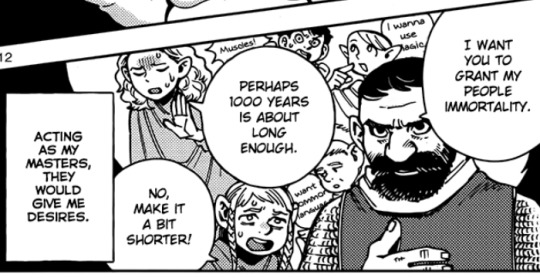
You can see at least 3 different races here that are asking for different life spans, what they’re asking for lines up with what the lifespans are.
the dwarf asked for immortality, the elf asked specifically for a thousand year life, the half foot heard this and said that was too long, and to make it shorter. The only ones who didn’t ask for a lifespan alteration were the (would be) tall-men.
The lifespans aren’t natural, they’re caused by the demons magic…
part 2: so what of the demons magic?

This is I think the most explicit statement, that the demons magic, every wish the demon granted, is lost. This includes lifespans, one of the oldest wishes it granted.
And I wanna highlight one thing she says specifically. “We have the luxury of time”.
I don’t think that means a long life, I think it means the opposite. The narrative regards these lifespans as unnatural, destructive and soul sucking. The immortal townspeople are cursed, time doesn’t matter to them, and so they have no desires, or drive to continue. This is depicted by them finding food flavourless.

and when they no longer have immortality look at how they think of food. That is the luxury of time, not to avoid it, but to experience it. This is what the “long-lived” races must learn in the absence of the demon, now lacking the extra hundreds of years the demon had gifted them. That’s why it’s important that Marcille didn’t get her wish the way she wanted, because she wanted everyone to live forever.
And speaking of Marcille’s wish.
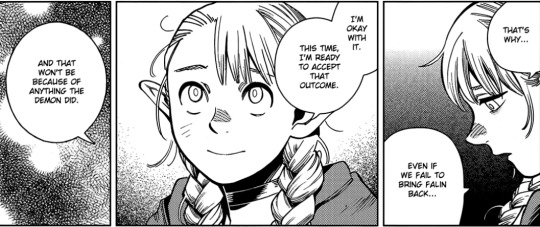
She says she’s learned to embrace death, and not because of anything the demon did. She wanted to live forever with her friends, she didn’t want to confront death. With the demons magic gone, she no longer has the extra thousand years. She’s learning to accept her friends mortality, yes, but she’s also learning to accept her own.
part 3: the theme of accepting death


Like I said earlier, Marcille is afraid of death. So is Delgal/Yaad. The end of the story resolves their acceptance around death and dying. As much as Marcille wanted everyone else to live, there’s a reason she decided everyone should just live a thousand years. She doesn’t want to sacrifice her own lifespan, she wants infinite time with the people she loves. In the aftermath of the winged lion, she instead gets a much shorter amount of time. Delgal/Yaad is similar, in that he feared death. He says he was afraid of dying and losing everything, but now he’s ok with that reality, because the reality of an extended or eternal life was much worse.
part 4: the curse of living and the curse of living too long

To desire is to eat is to live. Our most primal instincts.
The long lived races, while not immortal and desire-less, had an unnatural amount of time on their hands. They were able to forego their humanity because they’d been gifted all the time they wanted, which lead to fighting and oppression of the short lived races (which is why it’s important for Laios to be the king, even though the elves and dwarves have lost the demons magic. Their mindset at that point in time, is of people with too much time on their hands.)


When Falin speaks to the demon, stripped of all his desire, he describes living as cruel. From his perspective, humans have a limited time and a constant desire, sorrow and anxiety pressing at them. Yet, Falin says it’s delicious. The fear inherent to living is natural, it’s what makes life interesting, and so it’s thematically important that the magic allowing certain races to avoid this reality isn’t maintained. Marcille’s wish was based in truth, it was how she went about it that was wrong.
Part 5: the end of the racial power dynamic


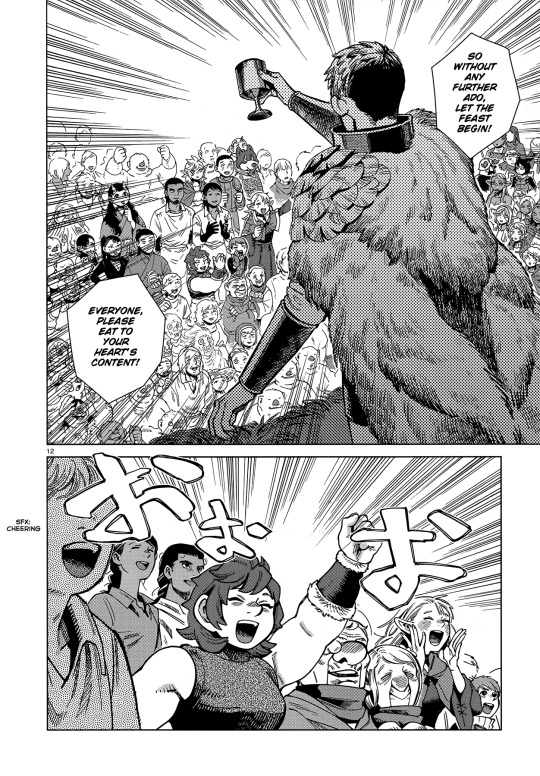
Obviously the races and cultures are still different, they were different before the winged lion began granting wishes, and will remain different, however what the narrative tells us again and again is that the lifespans are equivalent to a power structure. Elves and dwarves are at the top, because they were granted long lives. This power structure is explicitly not natural, it’s not how the races should be, Ryoko Kui emphasizes this several times.
So given this, I think it’s really important that at the end, when the demons magic is gone, all the races become one unit. There is no more power structure, is what this implies. One of humanities oldest desires, the desire to live eternally, is undone.
Ryoko Kui wanted to show that the racism and the power structures weren’t logical, and they weren’t natural, and now the people will have to navigate without those, without differences of lifespan, and without the ability to push away death.
part 6: conclusion





“Surely your kind exists for no reason but to starve” = “you exist for no reason but to die”
as Laios literally consumes life force itself, destroying the demon and destroying its magic. After he does this, the races are portrayed as one unit. The elves say that while magic isn’t gone, the demon’s and what came with it is, and that things will be different from thereon-out.

magic will continue to exist, but its been effectively reset, or unraveled, by the death of the demon.
the ability to live hundreds of years is lost, and while the winged lion, an eternal creature, thinks of this as a curse, to humans it’s a secret blessing. The impact of time is what keeps us going.
The structures set up by the ancient lifespan wishes are also undone. No race should get to live longer than any other, humans shouldn’t have unnatural structures like that. It disrupts the natural flow of living. Thats the resolution to the lifespan issue. Not “Marcille has to accept that she’s going to live an unnaturally long life”, but “Marcille has to accept that no one should have that much time, including her”.
That’s why I think the lifespan issue is resolved when the demon dies. Thanks for reading, if you managed to read all of this.

21 notes
·
View notes
Text
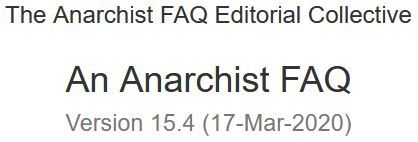
I.1.2 Is libertarian communism impossible?
In a word, no. While the “calculation argument” (see last section) is often used by propertarians (so-called right-wing “libertarians”) as the basis for the argument that communism (a moneyless society) is impossible, it is based on certain false ideas of what prices do, the nature of the market and how a communist-anarchist society would function. This is hardly surprising, as Mises based his theory on a variation of neo-classical economics and the Marxist social-democratic (and so Leninist) ideas of what a “socialist” economy would look like. So there has been little discussion of what a true (i.e. libertarian) communist society would be like, one that utterly transformed the existing conditions of production by workers’ self-management and the abolition of both wage-labour and money. However, it is useful here to indicate exactly why communism would work and why the “calculation argument” is flawed as an objection to it.
Mises argued that without money there was no way a socialist economy would make “rational” production decisions. Not even Mises denied that a moneyless society could estimate what is likely to be needed over a given period of time (as expressed as physical quantities of definite types and sorts of objects). As he argued, “calculation in natura in an economy without exchange can embrace consumption-goods only.” His argument was that the next step, working out which productive methods to employ, would not be possible, or at least would not be able to be done “rationally,” i.e. avoiding waste and inefficiency. The evaluation of producer goods “can only be done with some kind of economic calculation. The human mind cannot orient itself properly among the bewildering mass of intermediate products and potentialities without such aid. It would simply stand perplexed before the problems of management and location.” Thus we would quickly see “the spectacle of a socialist economic order floundering in the ocean of possible and conceivable economic combinations without the compass of economic calculation.” [“Economic Calculation in the Socialist Commonwealth”, pp. 87–130, Collectivist Economic Planning, F.A. von Hayek (ed.), p. 104, p. 103 and p. 110] Hence the claim that monetary calculation based on market prices is the only solution.
This argument is not without its force. How can a producer be expected to know if tin is a better use of resources than iron when creating a product if all they know is that iron and tin are available and suitable for their purpose? Or, if we have a consumer good which can be made with A + 2B or 2A + B (where A and B are both input factors such as steel, oil electricity, etc.) how can we tell which method is more efficient (i.e. which one used least resources and so left the most over for other uses)? With market prices, Mises’ argued, it is simple. If A cost $10 and B $5, then clearly method one would be the most efficient ($20 versus $25). Without the market, Mises argued, such a decision would be impossible and so every decision would be “groping in the dark.” [Op. Cit., p. 110]
Mises’ argument rests on three flawed assumptions, two against communism and one for capitalism. The first two negative assumptions are that communism entails central planning and that it is impossible to make investment decisions without money values. We discuss why each is wrong in this section. Mises’ positive assumption for capitalism, namely that markets allow exact and efficient allocation of resources, is discussed in section I.1.5.
Firstly, Mises assumes a centralised planned economy. As Hayek summarised, the crux of the matter was “the impossibility of a rational calculation in a centrally directed economy from which prices are necessarily absent”, one which “involves planning on a most extensive scale — minute direction of practically all productive activity by one central authority”. Thus the “one central authority has to solve the economic problem of distributing a limited amount of resources between a practically infinite number of competing purposes” with “a reasonable degree of accuracy, with a degree of success equally or approaching the results of competitive capitalism” is what “constitutes the problem of socialism as a method.” [“The Nature and History of the Problem”, pp. 1–40, Op. Cit., p. 35, p. 19 and pp. 16–7]
While this was a common idea in Marxian social democracy (and the Leninism that came from it), centralised organisations are rejected by anarchism. As Bakunin argued, “where are the intellects powerful enough to embrace the infinite multiplicity and diversity of real interests, aspirations, wishes, and needs which sum up the collective will of the people? And to invent a social organisation that will not be a Procrustean bed upon which the violence of the State will more or less overtly force unhappy society to stretch out?” Moreover, a socialist government, “unless it were endowed with omniscience, omnipresence, and the omnipotence which the theologians attribute to God, could not possibly know and foresee the needs of its people, or satisfy with an even justice those interests which are most legitimate and pressing.” [Bakunin on Anarchism, pp. 268–9 and p. 318] For Malatesta, such a system would require “immense centralisation” and would either be “an impossible thing to achieve, or, if possible, would end up as a colossal and very complex tyranny.” [At the Café, p. 65]
Kropotkin, likewise, dismissed the notion of central planning as the “economic changes that will result from the social revolution will be so immense and so profound … that it will be impossible for one or even a number of individuals to elaborate the social forms to which a further society must give birth. The elaboration of new social forms can only be the collective work of the masses.” [Words of a Rebel, p. 175] The notion that a “strongly centralised Government” could ”command that a prescribed quantity” of a good “be sent to such a place on such a day” and be “received on a given day by a specified official and stored in particular warehouses” was not only “undesirable” but also “wildly Utopian.” During his discussion of the benefits of free agreement against state tutelage, Kropotkin noted that only the former allowed the utilisation of “the co-operation, the enthusiasm, the local knowledge” of the people. [The Conquest of Bread, pp. 82–3 and p. 137]
Kropotkin’s own experience had shown how the “high functionaries” of the Tsarist bureaucracy “were simply charming in their innocent ignorance” of the areas they were meant to be administrating and how, thanks to Marxism, the socialist ideal had “lost the character of something that had to be worked out by the labour organisations themselves, and became state management of industries — in fact, state socialism; that is, state capitalism.” As an anarchist, he knew that governments become “isolated from the masses” and so “the very success of socialism” required “the ideas of no-government, of self-reliance, of free initiative of the individual” to be “preached side by side with those of socialised ownership and production.” Thus it was essential that socialism was decentralised, federal and participatory, that the “structure of the society which we longed for” was “worked out, in theory and practice, from beneath” in by “all labour unions” with “a full knowledge of local needs of each trade and each locality.” [Memoirs of a Revolutionist, p. 184, p. 360, p. 374–5 and p. 376]
So anarchists can agree with Mises that central planning cannot work in practice as its advocates hope. Or, more correctly, Mises agreed with the anarchists, as we had opposed central planning first. We have long recognised that no small body of people can be expected to know what happens in society and plan accordingly (“No single brain nor any bureau of brains can see to this organisation.” [Issac Puente, Libertarian Communism, p. 29]). Moreover, there is the pressing question of freedom as well, for “the despotism of [the ‘socialist’] State would be equal to the despotism of the present state, increased by the economic despotism of all the capital which would pass into the hands of the State, and the whole would be multiplied by all the centralisation necessary for this new State. And it is for this reason that we, the Anarchists, friends of liberty, we intend to fight them to the end.” [Carlo Cafiero, “Anarchy and Communism”, pp. 179–86, The Raven, No. 6, p. 179]
As John O’Neill summarises, the “argument against centralised planning is one that has been articulated within the history of socialist planning as an argument for democratic and decentralised decision making.” [The Market, p. 132] So, for good economic and political reasons, anarchists reject central planning. This central libertarian socialist position feeds directly into refuting Mises’ argument, for while a centralised system would need to compare a large (“infinite”) number of possible alternatives to a large number of possible needs, this is not the case in a decentralised system. Rather than a vast multitude of alternatives which would swamp a centralised planning agency, one workplace comparing different alternatives to meet a specific need faces a much lower number of possibilities as the objective technical requirements (use-values) of a project are known and so local knowledge will eliminate most of the options available to a small number which can be directly compared.
As such, removing the assumption of a central planning body automatically drains Mises’ critique of much of its force — rather than an “the ocean of possible and conceivable economic combinations” faced by a central body, a specific workplace or community has a more limited number of possible solutions for a limited number of requirements. Moreover, any complex machine is a product of less complex goods, meaning that the workplace is a consumer of other workplace’s goods. If, as Mises admitted, a customer can decide between consumption goods without the need for money then the user and producer of a “higher order” good can decide between consumption goods required to meet their needs.
In terms of decision making, it is true that a centralised planning agency would be swamped by the multiple options available to it. However, in a decentralised socialist system individual workplaces and communes would be deciding between a much smaller number of alternatives. Moreover, unlike a centralised system, the individual firm or commune knows exactly what is required to meet its needs, and so the number of possible alternatives is reduced as well (for example, certain materials are simply technically unsuitable for certain tasks).
Mises’ other assumption is equally flawed. This is that without the market, no information is passed between producers beyond the final outcome of production. In other words, he assumed that the final product is all that counts in evaluating its use. Needless to say, it is true that without more information than the name of a given product it is impossible to determine whether using it would be an efficient utilisation of resources. Yet more information can be provided which can be used to inform decision making. As socialists Adam Buick and John Crump point out, “at the level of the individual production unit or industry, the only calculations that would be necessary in socialism would be calculations in kind. On the one side would be recorded the resources (materials, energy, equipment, labour) used up in production and on the other the amount of good produced, together with any by-products… . Socialist production is simply the production of use values from use values, and nothing more.” [State Capitalism: The Wages System Under New Management, p. 137] Thus any good used as an input into a production process would require the communication of this kind of information.
The generation and communication of such information implies a decentralised, horizontal network between producers and consumers. This is because what counts as a use-value can only be determined by those directly using it. Thus the production of use-values from use-values cannot be achieved via central planning, as the central planners have no notion of the use-value of the goods being used or produced. Such knowledge lies in many hands, dispersed throughout society, and so socialist production implies decentralisation. Capitalist ideologues claim that the market allows the utilisation of such dispersed knowledge, but as John O’Neill notes, “the market may be one way in which dispersed knowledge can be put to good effect. It is not … the only way”. “The strength of the epistemological argument for the market depends in part on the implausibility of assuming that all knowledge could be centralised upon some particular planning agency” he stresses, but Mises’ “argument ignores, however, the existence of the decentralised but predominantly non-market institutions for the distribution of knowledge … The assumption that only the market can co-ordinate dispersed non-vocalisable knowledge is false.” [Op. Cit., p. 118 and p. 132]
So, in order to determine if a specific good is useful to a person, that person needs to know its “cost.” Under capitalism, the notion of cost has been so associated with price that we have to put the word “cost” in quotation marks. However, the real cost of, say, writing a book, is not a sum of money but so much paper, so much energy, so much ink, so much human labour. In order to make a rational decision on whether a given good is better for meeting a given need than another, the would-be consumer requires this information. However, under capitalism this information is hidden by the price.
Somewhat ironically, given how “Austrian” economics tends to stress that the informational limitations are at the root of its “impossibility” of socialism, the fact is that the market hides a significant amount of essential information required to make a sensible investment decision. This can be seen from an analysis of Mises’ discussion on why labour-time cannot replace money as a decision-making tool. Using labour, he argued, “leaves the employment of material factors of production out of account” and presents an example of two goods, P and Q, which take 10 hours to produce. P takes 8 hours of labour, plus 2 units of raw material A (which is produced by an hour’s socially necessary labour). Q takes 9 hours of labour and one unit of A. He asserts that in terms of labour P and Q “are equivalent, but in value terms P is more valuable than Q. The former is false, and only the later corresponds to the nature and purpose of calculation.” [“Economic Calculation in the Socialist Commonwealth”, Op. Cit., p. 113]
The flaw in his argument is clear. Assuming that an hour of socially necessary labour is £10 then, in price terms, P would have £80 of direct labour costs, with £20 of raw material A while Q would have £90 of direct labour and £10 of A. Both cost £100 so it hard to see how this “corresponds to the nature and purpose of calculation”! Using less of raw material A is a judgement made in addition to “calculation” in this example. The question of whether to economise on the use of A simply cannot be made using prices. If P, for example, can only be produced via a more ecologically destructive process than Q or if the work process by which P is created is marked by dull, mindless work but Q’s is more satisfying for the people involved than Q may be considered a better decision. Sadly, that kind of information is not communicated by the price mechanism.
As John O’Neill points out, “Mises’ earlier arguments against socialist planning turned on an assumption about commensurability. His central argument was that rational economic decision-making required a single measure on the basis of which the worth of alternative states of affairs could be calculated and compared.” [Ecology, Policy and Politics, p. 115] This central assumption was unchallenged by Taylor and Lange in their defence of “socialism”, meaning that from the start the debate against Mises was defensive and based on the argument that socialist planning could mimic the market and produce results which were efficient from a capitalist point of view.
Anarchists question whether using prices means basing all decision making on one criterion and ignoring all others is a rational thing to do. As O’Neill suggests, “the relative scarcity of items … hardly exhaust the full gamut of information that is distributed throughout society which might be relevant to the co-ordination of economic activities and plans.” [The Market, p. 196] Saying that a good costs £10 does not tell you much about the amount of pollution its production or use generates, under what conditions of labour it was produced, whether its price is affected by the market power of the firm producing it, whether it is produced in an ecologically sustainable way, and so forth. Similarly, saying that another, similar, good costs £9 does not tell you whether than £1 difference is due to a more efficient use of inputs or whether it is caused by imposing pollution onto the planet.
And do prices actually reflect costs? The question of profit, the reward for owning capital and allowing others to use it, is hardly a cost in the same way as labour, resources and so on (attempts to explain profits as an equivalent sacrifice as labour have always been ridiculous and quickly dropped). When looking at prices to evaluate efficient use for goods, you cannot actually tell by the price if this is so. Two goods may have the same price, but profit levels (perhaps under the influence of market power) may be such that one has a higher cost price than another. The price mechanism fails to indicate which uses least resources as it is influenced by market power. Indeed, as Takis Fotopoulos notes, ”[i]f … both central planning and the market economy inevitably lead to concentrations of power, then neither the former nor the latter can produce the sort of information flows and incentives which are necessary for the best functioning of any economic system.” [Towards an Inclusive Democracy, p. 252] Moreover, a good produced under a authoritarian state which represses its workforce could have a lower price than one produced in a country which allowed unions to organise and has basic human rights. The repression would force down the cost of labour, so making the good in question appear as a more “efficient” use of resources. In other words, the market can mask inhumanity as “efficiency” and actually reward that behaviour by market share.
In other words, market prices can be horribly distorted in that they ignore quality issues. Exchanges therefore occur in light of false information and, moreover, with anti-social motivations — to maximise short-term surplus for the capitalists regardless of losses to others. Thus they distort valuations and impose a crass, narrow and ultimately self-defeating individualism. Prices are shaped by more than costs, with, for example, market power increasing market prices far higher than actual costs. Market prices also fail to take into account public goods and so bias allocation choices against them not to mention ignoring the effects on the wider society, i.e. beyond the direct buyers and sellers. Similarly, in order to make rational decisions relating to using a good, you need to know why the price has changed for if a change is permanent or transient implies different responses. Thus the current price is not enough in itself. Has the good become more expensive temporarily, due, say, to a strike? Or is it because the supply of the resource has been exhausted? Actions that are sensible in the former situation will be wrong in the other. As O’Neill suggests, “the information [in the market] is passed back without dialogue. The market informs by ‘exit’ — some products find a market, others do not. ‘Voice’ is not exercised. This failure of dialogue … represents an informational failure of the market, not a virtue … The market … does distribute information … it also blocks a great deal.” [Op. Cit., p. 99]
So a purely market-based system leaves out information on which to base rational resource allocations (or, at the very least, hides it). The reason for this is that a market system measures, at best, preferences of individual buyers among the available options. This assumes that all the pertinent use-values that are to be outcomes of production are things that are to be consumed by the individual, rather than use-values that are collectively enjoyed (like clean air). Prices in the market do not measure social costs or externalities, meaning that such costs are not reflected in the price and so you cannot have a rational price system. Similarly, if the market measures only preferences amongst things that can be monopolised and sold to individuals, as distinguished from values that are enjoyed collectively, then it follows that information necessary for rational decision-making in production is not provided by the market. In other words, capitalist “calculation” fails because private firms are oblivious to the social cost of their labour and raw materials inputs.
Indeed, prices often mis-value goods as companies can gain a competitive advantage by passing costs onto society (in the form of pollution, for example, or de-skilling workers, increasing job insecurity, and so on). This externalisation of costs is actually rewarded in the market as consumers seek the lowest prices, unaware of the reasons why it is lower (such information cannot be gathered from looking at the price). Even if we assume that such activity is penalised by fines later, the damage is still done and cannot be undone. Indeed, the company may be able to weather the fines due to the profits it originally made by externalising costs (see section E.3). Thus the market creates a perverse incentive to subsidise their input costs through off-the-book social and environmental externalities. As Chomsky suggests:
“it is by now widely realised that the economist’s ‘externalities can no longer be consigned to footnotes. No one who gives a moment’s thought to the problems of contemporary society can fail to be aware of the social costs of consumption and production, the progressive destruction of the environment, the utter irrationality of the utilisation of contemporary technology, the inability of a system based on profit or growth-maximisation to deal with needs that can only be expressed collectively, and the enormous bias this system imposes towards maximisation of commodities for personal use in place of the general improvement of the quality of life.” [Radical Priorities, pp. 190–1]
Prices hide the actual costs that production involved for the individual, society, and the environment, and instead boils everything down into one factor, namely price. There is a lack of dialogue and information between producer and consumer.
Moreover, without using another means of cost accounting instead of prices how can supporters of capitalism know there is a correlation between actual and price costs? One can determine whether such a correlation exists by measuring one against the other. If this cannot be done, then the claim that prices measure costs is a tautology (in that a price represents a cost and we know that it is a cost because it has a price). If it can be done, then we can calculate costs in some other sense than in market prices and so the argument that only market prices represent costs falls. Equally, there may be costs (in terms of quality of life issues) which cannot be reflected in price terms.
Simply put, the market fails to distribute all relevant information and, particularly when prices are at disequilibrium, can communicate distinctly misleading information. In the words of two South African anarchists, “prices in capitalism provided at best incomplete and partial information that obscured the workings of capitalism, and would generate and reproduce economic and social inequalities. Ignoring the social character of the economy with their methodological individualism, economic liberals also ignored the social costs of particular choices and the question of externalities.” [Michael Schmidt and Lucien van der Walt, Black Flame, p. 92] This suggests that prices cannot be taken to reflect real costs any more that they can reflect the social expression of the valuation of goods. They are the result of a conflict waged over these goods and those that acted as their inputs (including, of course, labour). Market and social power, much more than need or resource usage, decides the issue. The inequality in the means of purchasers, in the market power of firms and in the bargaining position of labour and capital all play their part, so distorting any relationship a price may have to its costs in terms of resource use. Prices are misshapen.
Little wonder Kropotkin asked whether “are we not yet bound to analyse that compound result we call price rather than to accept it as a supreme and blind ruler of our actions?” [Fields, Factories and Workshops Tomorrow, p. 71] It is precisely these real costs, hidden by price, which need to be communicated to producers and consumers for them to make informed and rational decisions concerning their economic activity.
It is useful to remember that Mises argued that it is the complexity of a modern economy that ensures money is required: “Within the narrow confines of household economy, for instance, where the father can supervise the entire economic management, it is possible to determine the significance of changes in the processes of production, without such aids to the mind [as monetary calculation], and yet with more or less of accuracy.” However, “the mind of one man alone — be it ever so cunning, is too weak to grasp the importance of any single one among the countlessly many goods of higher order. No single man can ever master all the possibilities of production, innumerable as they are, as to be in a position to make straightway evident judgements of value without the aid of some system of computation.” [Op. Cit., p. 102]
A libertarian communist society would, it must be stressed, use various “aids to the mind” to help individuals and groups to make economic decisions. This would reduce the complexity of economic decision making, by allowing different options and resources to be compared to each other. Hence the complexity of economic decision making in an economy with a multitude of goods can be reduced by the use of rational algorithmic procedures and methods to aid the process. Such tools would aid decision making, not dominate it as these decisions affect humans and the planet and should never be made automatically.
That being the case, a libertarian communist society would quickly develop the means of comparing the real impact of specific “higher order” goods in terms of their real costs (i.e. the amount of labour, energy and raw materials used plus any social and ecological costs). Moreover, it should be remembered that production goods are made up on inputs of other goods, that is, higher goods are made up of consumption goods of a lower order. If, as Mises admits, calculation without money is possible for consumption goods then the creation of “higher order” goods can be also achieved and a record of its costs made and communicated to those who seek to use it.
While the specific “aids to the mind” as well as “costs” and their relative weight would be determined by the people of a free society, we can speculate that it would include direct and indirect labour, externalities (such as pollution), energy use and materials, and so forth. As such, it must be stressed that a libertarian communist society would seek to communicate the “costs” associated with any specific product as well as its relative scarcity. In other words, it needs a means of determining the objective or absolute costs associated with different alternatives as well as an indication of how much of a given good is available at a given it (i.e., its scarcity). Both of these can be determined without the use of money and markets.
Section I.4 discusses possible frameworks for an anarchist economy, including suggestions for libertarian communist economic decision-making processes. In terms of “aids to the mind”, these include methods to compare goods for resource allocation by indicating the absolute costs involved in producing a good and the relative scarcity of a specific good, among other things. Such a framework is necessary because “an appeal to a necessary role for practical judgements in decision making is not to deny any role to general principles. Neither … does it deny any place for the use of technical rules and algorithmic procedures … Moreover, there is a necessary role for rules of thumb, standard procedures, the default procedures and institutional arrangements that can be followed unreflectively and which reduce the scope for explicit judgements comparing different states of affairs. There are limits in time, efficient use of resources and the dispersal of knowledge which require rules and institutions. Such rules and institutions can free us for space and time for reflective judgements where they matter most.” [John O’Neill, Ecology, Policy and Politics, pp. 117–8] It is these “rules and institutions need themselves to be open to critical and reflective appraisal.” [O’Neill, The Market, p. 118]
Economic decisions, in other words, cannot be reduced down to one factor yet Mises argued that anyone “who wished to make calculations in regard to a complicated process of production will immediately notice whether he has worked more economically than others or not; if he finds, from reference to the exchange values obtaining in the market, that he will not be able to produce profitably, this shows that others understand how to make better use of the higher-order goods in question.” [Op. Cit., pp. 97–8] However, this only shows whether someone has worked more profitably than others, not whether it is more economical. Market power automatically muddles this issue, as does the possibility of reducing the monetary cost of production by recklessly exploiting natural resources and labour, polluting, or otherwise passing costs onto others. Similarly, the issue of wealth inequality is important, for if the production of luxury goods proves more profitable than basic essentials for the poor does this show that producing the former is a better use of resources? And, of course, the key issue of the relative strength of market power between workers and capitalists plays a key role in determining “profitably.”
Basing your economic decision making on a single criteria, namely profitability, can, and does, lead to perverse results. Most obviously, the tendency for capitalists to save money by not introducing safety equipment (“To save a dollar the capitalist build their railroads poorly, and along comes a train, and loads of people are killed. What are their lives to him, if by their sacrifice he has saved money?” [Emma Goldman, A Documentary History of the American Years, vol. 1, p. 157]). Similarly, it is considered a more “efficient” use of resources to condemn workers to deskilling and degrading work than “waste” resources in developing machines to eliminate or reduce it (“How many machines remain unused solely because they do not return an immediate profit to the capitalist! … How many discoveries, how many applications of science remain a dead letter solely because they don’t bring the capitalist enough!” [Carlo Cafiero, “Anarchy and Communism”, pp. 179–86, The Raven, No. 6, p. 182]). Similarly, those investments which have a higher initial cost but which, in the long run, would have, say, a smaller environmental impact would not be selected in a profit-driven system.
This has seriously irrational effects, because the managers of capitalist enterprises are obliged to choose technical means of production which produce the cheapest results. All other considerations are subordinate, in particular the health and welfare of the producers and the effects on the environment. The harmful effects resulting from “rational” capitalist production methods have long been pointed out. For example, speed-ups, pain, stress, accidents, boredom, overwork, long hours and so on all harm the physical and mental health of those involved, while pollution, the destruction of the environment, and the exhaustion of non-renewable resources all have serious effects on both the planet and those who live on it. As green economist E. F. Schumacher argued:
“But what does it mean when we say that something is uneconomic? . .. [S]omething is uneconomic when it fails to earn an adequate profit in terms of money. The method of economics does not, and cannot, produce any other meaning … The judgement of economics … is an extremely fragmentary judgement; out of the large number of aspects which in real life have to be seen and judged together before a decision can be taken, economics supplies only one — whether a money profit accrues to those who undertake it or not.” [Small is Beautiful, pp. 27–8]
Schumacher stressed that “about the fragmentary nature of the judgements of economics there can be no doubt whatever. Even with the narrow compass of the economic calculus, these judgements are necessarily and methodically narrow. For one thing, they give vastly more weight to the short than to the long term… [S]econd, they are based on a definition of cost which excludes all ‘free goods’ … [such as the] environment, except for those parts that have been privately appropriated. This means that an activity can be economic although it plays hell with the environment, and that a competing activity, if at some cost it protects and conserves the environment, will be uneconomic.” Moreover, ”[d]o not overlook the words ‘to those who undertake it.’ It is a great error to assume, for instance, that the methodology of economics is normally applied to determine whether an activity carried out by a group within society yields a profit to society as a whole.” [Op. Cit., p. 29]
To claim that prices include all these “externalities” is nonsense. If they did, we would not see capital moving to third-world countries with few or no anti-pollution or labour laws. At best, the “cost” of pollution would only be included in a price if the company was sued successfully in court for damages — in other words, once the damage is done. Ultimately, companies have a strong interest in buying inputs with the lowest prices, regardless of how they are produced. In fact, the market rewards such behaviour as a company which was socially responsible would be penalised by higher costs, and so market prices. It is reductionist accounting and its accompanying “ethics of mathematics” that produces the “irrationality of rationality” which plagues capitalism’s exclusive reliance on prices (i.e. profits) to measure “efficiency.”
Ironically enough, Mises also pointed to the irrational nature of the price mechanism. He stated (correctly) that there are “extra-economic” elements which “monetary calculation cannot embrace” because of “its very nature.” He acknowledged that these “considerations themselves can scarcely be termed irrational” and, as examples, listed ”[i]n any place where men regard as significant the beauty of a neighbourhood or a building, the health, happiness and contentment of mankind, the honour of individuals or nations.” He also noted that “they are just as much motive forces of rational conduct as are economic factors” but they “do not enter into exchange relationships.” How rational is an economic system which ignores the “health, happiness and contentment” of people? Or the beauty of their surroundings? Which, moreover, penalises those who take these factors into consideration? For anarchists, Mises comments indicate well the inverted logic of capitalism. That Mises can support a system which ignores the needs of individuals, their happiness, health, surroundings, environment and so on by “its very nature” says a lot. His suggestion that we assign monetary values to such dimensions begs the question and has plausibility only if it assumes what it is supposed to prove. [Op. Cit., p. 99–100] Indeed, the person who would put a price on friendship simply would have no friends as they simply do not understand what friendship is and are thereby excluded from much which is best in human life. Likewise for other “extra-economic” goods that individual’s value, such as beautiful places, happiness, the environment and so on.
So essential information required for sensible decision making would have to be recorded and communicated in a communist society and used to evaluate different options using agreed methods of comparison. This differs drastically from the price mechanism as it recognises that mindless, automatic calculation is impossible in social choices. Such choices have an unavoidable ethical and social dimension simply because they involve other human beings and the environment. As Mises himself acknowledged, monetary calculation does not capture such dimensions.
We, therefore, need to employ practical judgement in making choices aided by a full understanding of the real social and ecological costs involved using, of course, the appropriate “aids to the mind.” Given that an anarchist society would be complex and integrated, such aids would be essential but, due to its decentralised nature, it need not embrace the price mechanism. It can evaluate the efficiency of its decisions by looking at the real costs involved to society rather than embrace the distorted system of costing explicit in the price mechanism (as Kropotkin once put it, “if we analyse price” we must “make a distinction between its different elements”. [Op. Cit., p. 72]).
In summary, then, Mises considered only central planning as genuine socialism, meaning that a decentralised communism was not addressed. Weighting up the pros and cons of how to use millions of different goods in the millions of potential situations they could be used would be impossible in a centralised system, yet in decentralised communism this is not an issue. Each individual commune and syndicate would be choosing from the few alternatives required to meet their needs. With the needs known, the alternatives can be compared — particularly if agreed criteria (“aids to the mind”) are utilised and the appropriate agreed information communicated.
Efficient economic decision making in a moneyless “economy” is possible, assuming that sufficient information is passed between syndicates and communes to evaluate the relative and absolute costs of a good. Thus, decisions can be reached which aimed to reduce the use of goods in short supply or which take large amounts of resources to produce (or which produce large externalities to create). While a centralised system would be swamped by the large number of different uses and combinations of goods, a decentralised communist system would not be.
Thus, anarchists argue that Mises was wrong. Communism is viable, but only if it is libertarian communism. Ultimately, though, the real charge is not that socialism is “impossible” but rather that it would be inefficient, i.e., it would allocate resources such that too much is used to achieve specified goals and that there would be no way to check that the allocated resources were valued sufficiently to warrant their use in the first place. While some may portray this as a case of planning against markets (no-planning), this is false. Planning occurs in capitalism (as can be seen from any business), it is a question of whether capitalism ensures that more plans can be co-ordinated and needs meet by means of relative prices and profit-loss accounting than by communism (free access and distribution according to need). As such, the question is does the capitalist system adds additional problems to the efficient co-ordination of plans? Libertarian communists argue, yes, it does (as we discuss at length in section I.1.5).
All choices involve lost possibilities, so the efficient use of resources is required to increase the possibilities for creating other goods. At best, all you can say is that by picking options which cost the least a market economy will make more resources available for other activities. Yet this assumption crucially depends equating “efficient” with profitable, a situation which cannot be predicted beforehand and which easily leads to inefficient allocation of resources (particularly if we are looking at meeting human needs). Then there are the costs of using money for if we are talking of opportunity costs, of the freeing up of resources for other uses, then the labour and other resources used to process money related activities should be included. While these activities (banking, advertising, defending property, and so forth) are essential to a capitalist economy, they are not needed and unproductive from the standpoint of producing use values or meeting human need. This would suggest that a libertarian communist economy would have a productive advantage over a capitalist economy as the elimination of this structural waste intrinsic to capitalism will free up a vast amount of labour and materials for socially useful production. This is not to mention the so-called “costs” which are no such thing, but relate to capitalist property rights. Thus “rent” may be considered a cost under capitalism, but would disappear if those who used a resource controlled it rather than pay a tribute to gain access to it. As Kropotkin argued, “the capitalist system makes us pay for everything three or four times its labour value” thanks to rent, profit, interest and the actions of middle men. Such system specific “costs” hide the actual costs (in terms of labour and resource use) by increasing the price compared to if we “reckon our expenses in labour”. [Op. Cit., p. 68]
Moreover, somewhat ironically, this “economising” of resources which the market claims to achieve is not to conserve resources for future generations or to ensure environmental stability. Rather, it is to allow more goods to be produced in order to accumulate more capital. It could be argued that the market forces producers to minimise costs on the assumption that lower costs will be more likely to result in higher profits. However, this leaves the social impact of such cost-cutting out of the equation. For example, imposing externalities on others does reduce a firm’s prices and, as a result, is rewarded by the market however alienating and exhausting work or rising pollution levels does not seem like a wise thing to do. So, yes, it is true that a capitalist firm will seek to minimise costs in order to maximise profits. This, at first glance, could be seen as leading to an efficient use of resources until such time as the results of this become clear. Thus goods could be created which do not last as long as they could, which need constant repairing, etc. So a house produced “efficiently” under capitalism could be a worse place to live simply because costs were reduced by cutting corners (less insulation, thinner walls, less robust materials, etc.). In addition, the collective outcome of all these “efficient” decisions could be socially inefficient as they reduce the quality of life of those subject to them as well as leading to over-investment, over-production, falling profits and economic crisis. As such, it could be argued that Mises’ argument exposes more difficulties for capitalism rather than for anarchism.
Finally, it should be noted that most anarchists would question the criteria Hayek and Mises used to judge the relative merits of communism and capitalism. As the former put it, the issue was “a distribution of income independent of private property in the means of production and a volume of output which was at least approximately the same or even greater than that procured under free competition.” [“The Nature and History of the Problem”, Op. Cit., p. 37] Thus the issue is reduced to that of output (quantity), not issues of freedom (quality). If slavery or Stalinism had produced more output than free market capitalism, that would not make either system desirable This was, in fact, a common argument against Stalinism during the 1950s and 1960s when it did appear that central planning was producing more goods (and, ironically, by the propertarian right against the welfare state for, it should be remembered, that volume of output, like profitability and so “efficiency”, in the market depends on income distribution and a redistribution from rich to poor could easily result in more output becoming profitable). Similarly, that capitalism produces more alcohol and Prozac to meet the higher demand for dulling the minds of those trying to survive under it would not be an argument against libertarian communism! As we discuss in section I.4, while anarchists seek to meet material human needs we do not aim, as under capitalism, to sacrifice all other goals to that aim as capitalism does. Thus, to state the obvious, the aim for maximum volume of output only makes sense under capitalism as the maximum of human happiness and liberty may occur with a lower volume of output in a free society. The people of a society without oppression, exploitation and alienation will hardly act in identical ways, nor seek the same volume of output, as those in one, like capitalism, marked by those traits!
Moreover, the volume of output is a somewhat misleading criteria as it totally ignores its distribution. If the bulk of that volume goes to a few, then that is hardly a good use of resources. This is hardly an academic concern as can be seen from the Hayek influenced neo-liberalism of the 1980s onwards. As economist Paul Krugman notes, the value of the output of an average worker “has risen almost 50 percent since 1973. Yet the growing concentration of income in the hands of a small minority had proceeded so rapidly that we’re not sure whether the typical American has gained anything from rising productivity.” This means that wealth have flooded upwards, and “the lion’s share of economic growth in America over the past thirty years has gone to a small, wealthy minority.” [The Conscience of a Liberal, p. 124 and p. 244]
To conclude. Capitalist “efficiency” is hardly rational and for a fully human and ecological efficiency libertarian communism is required. As Buick and Crump point out, “socialist society still has to be concerned with using resources efficiently and rationally, but the criteria of ‘efficiency’ and ‘rationality’ are not the same as they are under capitalism.” [Op. Cit., p. 137] Under communist-anarchism, the decision-making system used to determine the best use of resources is not more or less “efficient” than market allocation, because it goes beyond the market-based concept of “efficiency.” It does not seek to mimic the market but to do what the market fails to do. This is important, because the market is not the rational system its defenders often claim. While reducing all decisions to one common factor is, without a doubt, an easy method of decision making, it also has serious side-effects because of its reductionistic basis. The market makes decision making simplistic and generates a host of irrationalities and dehumanising effects as a result. So, to claim that communism will be “more” efficient than capitalism or vice versa misses the point. Libertarian communism will be “efficient” in a totally different way and people will act in ways considered “irrational” only under the narrow logic of capitalism.
For another critique of Mises, see Robin Cox’s “The ‘Economic Calculation’ controversy: unravelling of a myth” [Common Voice, Issue 3]
#anarchist society#practical#practical anarchism#practical anarchy#faq#anarchy faq#revolution#anarchism#daily posts#communism#anti capitalist#anti capitalism#late stage capitalism#organization#grassroots#grass roots#anarchists#libraries#leftism#social issues#economy#economics#climate change#climate crisis#climate#ecology#anarchy works#environmentalism#environment#solarpunk
15 notes
·
View notes
Text
Do you know how hard it is to avoid spoilers when youre reading The PJO/HoO series for the first time and Jason Grace is your favorite character? Let me tell you, it's really freaking hard.
#midnight rambles#percy jackson#heroes of olympus#jason grace#its so hard!#i already got partially spoiled about what happens to him#i have been able to avoid the how at least
54 notes
·
View notes
Text
ok executive dysfunction is kind of ruining my life actually
#i have an incredibly time-consuming project i NEED to finish and i genuinely don’t know if i can#i’ve started which is good but i’m horrifically behind where i need to be and i’m just so overwhelmed#i technically have enough time to finish it i think? but it’s my final project so i literally cannot miss this deadline#my professor is really cool + likes me but it’s already been so long w/out me bringing it up#and wtf am i supposed to say? yeah. i WANTED to work on it. i just chose not to????? like wtf#it’s just so humiliating and i’m so behind i don’t know wtf i’m gonna do#it’s worse bc it’s an animation and it’s gg related and i really really wanted this to be good and i wanted things to be different this time#kind of funny bc i’m actually mid getting an adhd diagnosis rn but it’s just so fucking awful because i do this constantly#it fucking sucks so much i feel so helpless and i don’t know wtf is wrong with me. i’m so tired of letting everyone down constantly#it’s so bad rn i literally cannot do anything. it’s humiliating like WHY can’t i just be a functional normal person#it fucking SUCKS because i KNOW if i had any self control or work ethic whatsoever i could be really fucking successful but i don’t.#so i won’t be i guess.#and i KNOW it’s tied into a bunch of different stuff too but like gd i DO NOT care i just want to be functional#worst case scenario i have an A in the class so if i completely blow it i’ll at least pass? hopefully?#i might be able to talk my prof into an extended deadline but it’s so embarrassing bc i didn’t need one in the first place.#i have literally no excuses#it just makes me so upset because i just keep doing this over and over and i don’t know how to stop it or how to get better#and LOL sorry for posting this here i just feel weird talking to anyone personally about this (+ currently avoiding responding to messages!)#it’s just like. man if i can’t get a fucking grip i will literally waste my entire life. Oh Well! LOL
6 notes
·
View notes
Text
Completely obsessed with the fact that half my tlt dash is just like: its honestly homophobic that i have to go to work, sleep, etc and i cant just mainline this book (which like, Big Mood)
And the other half is just:

Oh, how the other half lives 😭😭😭
#how dare life make me have Responsibilities!!!#nona the ninth#ntn#tlt#im like halfway done but still!!!! why do i have to go to sleep!!! i just wanna read!!!#i feel like i am able to digest it easier though by stretching it out at least#but ive been trying to be extremely dilligent about spoilers and so ive been avoiding going on this site too much#hence why the queue has run out
162 notes
·
View notes
Text
would be cool this yr to do like first aid training maybe?
#toy txt post#hope i can. get an opportunity to do that. not sure when. the horrors and inability to commit to things u see#but i think i should do that#at some point. altho i feel like i will almost certainly have to do CPR training? and like. like it seems like useful knowledge. and like.#i should know it and maybe im the worst person in existence for this but im a bit of a germaphobe and scared of covid and im not taking my#mask off so like. feels like. that is pretty mutually exclusive with CPR unless thereve been advancements im not aware of?#like would i be able to carry around some sort of billows but for human lungs to do that instead of my mouth? idk. this has in fact been#a legitimate hurdle to me wanting to pursue first aid training. sorry. genuinely dont know how to reconcile that and maybe! in a crisis#situation id overcome it to save a person. genuinely do not know. sorry im like a selfish horrible bitch tho and i cant see myself#doing CPR and am icked by the idea of even learning it. i know now they make those things to put on someones mouth but its still like.#that doesnt do anything against respiratory shit...idk. like is it worse to not pursue any of this at all to avoid the ethical quandry of#not wanting to deal with CPR even as a concept bc im a stupid baby squicked out by lip touching? or is it worse to do first aid and learn#like everything except CPR so i could still theoretically help in some cases that arent necessarily CPR. idk. im sure im just a Bad Person#for this and hate to even admit it. i think i should at least try to find a stop the bleed course or smth ig
4 notes
·
View notes
Text
applying for an apartment was. tbh. the worst experience of my life….if i don’t get accepted for this apartment i will kms so aggressively the whole world will explode just from my forceful energy alone…..
#michelle speaks#mostly it was bad bc of my dad lmfao but i also it has been the thing i have been having my anxiety nervous breakdowns over for months#and when that happens i cope by avoiding so i end up in a cycle where it’s like avoid the problem to not stress -> stress bc problem isn’t#solved -> avoid problem to reduce stress etc etc. so having to deal w the thing that was making me stressed is not easy for me 😩#like i physically could not get myself to finish the application yesterday bc i was so distressed lmfao. i did today tho just fine#if i am just able to get this apartment i will have one month of my life where i don’t have anything to stress abt at all.#wouldn’t that be beautiful for me ❤️ that hasn’t happened since like 2013 lmfao.#anyway i had to pay almost SIX HUNDRED DOLLARS just to apply. LMFAO. LIKE? are you INSANE??????#that should quite honestly be illegal. how can you make someone pay that much money when u might not even give them the apartment?#like that is CRAZY. i hate living in this world so much……i did NOT let my dad see that bc he would have EXPLODED lmfaooooo#so yeah landlords are evil but i have to go to law school so. LIFE!#at the VERY least that money should come out of ur first month of rent if u get a lease. like? just crazy fr……
10 notes
·
View notes
Text
Putting my journal down realizing maybe I shouldn't make a written plan to socialize more efficiently
#.txt#Is efficiently the right word. Diary entry incoming.#Going back and forth in recent days with feeling okay with one sided social stimulation and that's just kind of how my brain works#And recognizing I will not look like a well rounded person because I'm not able to maintain other people's interest in an acquaintanceship#It is likely. At least some part due to like labor isolation and all I do is work I do not have life events to interest people#All I can talk about is video games but incredibly limits the social pool because I like bad games.#And also to some degree distrust and the assumption my presence is unwanted. Which I've been working on a lot!#Today in particular is probably just a bad day.#And I have been very focused on life plans for the past week or so which has become very daunting#Planning on starting a business this year. Which is probably why I'm stressing about being able to reach people.#As it will become financially relevant and not just a personal failing I have accepted.#Reasonably it is probably a therapy thing to address being so afraid of other people. But I do not want to go to therapyyyy I'll do it.#Myself.#Normally.#Not dipping into woe is me I have no one territory at least as bad as I did when I was younger. Recognizing a pattern that I am enacting.#My responsibility to improve. Yada yada. I just wish it was a bit easier to feel my like. Presence.#And the constant improvement mindset straying into never good enough is very difficult to avoid.#And it's not a matter of being a good enough person to have close relationships. But I think its easiest to ascribe personal failure#When you are unable to do something. Well the most likely culprit is probably never leaving the house and being undiagnosed.#Which I can arguably do things about.#Also I'm tired. But I'm going to work on my resume tonight anyway and hope tummy pain passes and maybe talking to people will be easier#Another day.
3 notes
·
View notes
Text
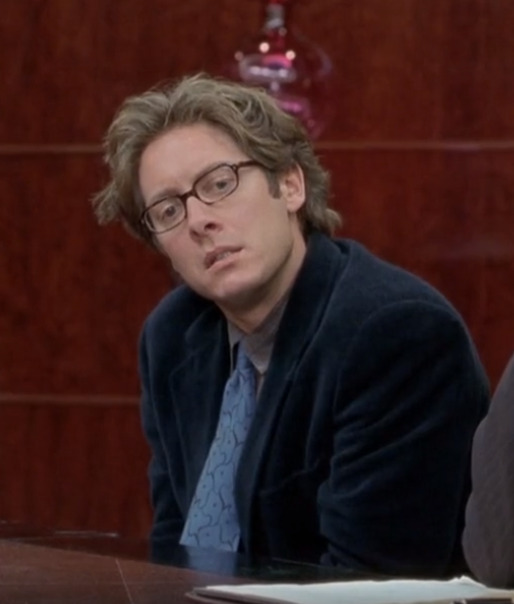
#my peculiar wife#i'm not rewatching speaking of sex atm i just found this in the vaults (my screenshot folder)#then again i might rewatch it today because i feel like shit and seeing him in such a..... state..... might improve matters#at least yesterday wasn't a total bust#and by that i mean i actually had a decent day yesterday which i haven't been able to say in ages#i left my cave and went to an estate sale where an incredibly attractive middle aged gentleman with silver hair let me have#these two big wooden roll top boxes full of cassettes (many of which are sealed blanks!) for five bucks.....#i haven't gone through them thoroughly yet but it looks like there's a lot of early appalachian gospel#can't go wrong there.........#the man kept calling me sir#sometimes it baffles me that i “”“pass”“” these days because my hair is so damn long and i keep my face clean shaven#so that's nice#with how depressed i've been sometimes i hate to acknowledge when i have a decent day or even a decent moment#because i almost superstitiously feel it will act as a magnet for my depression to swoop in and feed on it#and out of that fear my depression has developed this sort of..... personified stubbornness#where i both consciously and unconsciously avoid what might allow for an opening for “decent moments”.. pleasure.. joy.. whatever might#might grant me relief from pain even just for a moment etc#i don't know what i'm trying to describe here all i know is i feel trying to announce or acknowledge any sort of happiness i experience#feels like i'm directly endangering it#my brain is too scattered right now to try to articulate anything and i don't know why i'm doing so in the tags of a photo of#my peculiar wife james spader#just trying to exist again and not let myself be a hermit to the extent of harold smith which is very much the path i've been on for a long#long time#and i'm chipping away at that nonexistence in strange ways but chipping away nonetheless.......
5 notes
·
View notes
Text
God I swear I’m not trying to be all doom and gloom talking about my health I know it’s annoying I just really need a break and everyone irl is already done with my shit bc I’ve been too anxious to go back to the doctor bc the last one told me I’d just have to deal with it and potentially get more surgeries and I’m 23 dude. It took nearly 3 years before my doctor even agreed that that surgery was necessary and it didn’t even fully fix my shit it just lessened the pain — which I’m grateful for, don’t get me wrong! But I haven’t had full limb function in my left arm since I was 15 and they made it sound like the surgery would fix it and then acted like I was overreacting when it didn’t. And my left leg has been deeply fucked for nearly as long, and at least slightly fucked at least since I hit double digits, and has gotten progressively worse. So like I know, I get it that I need to go to a doctor, but why would it go better now? What’s going to make a doctor take me seriously now?
I want to be angry, but I’m too tired.
#chronic health#chronic pain#cpunk#cripple punk#tw surgery#I was told (in a nonprofessional capacity) that I should be screened for ehlers danlos syndrome#which matches a lot of my symptoms#and my parental units want me to get screened for pots#and a heart murmur#and mitral valve prolapse#and asthma but I’ve been tested for that within the last 5 or 6 years and seem to be fine in that regard at least#I don’t want to keep doing this man#I would really like to be healthy#I miss ballet a fuckton#and martial arts#and just being able to go places with my friends without having to plan out how to avoid fainting or pain flares#maybe hEDS#I don’t want to clutter up the actual tags with my hypothetical shit#tw vent#fever’s vibe check#feverdreamsandlucidnightmares
2 notes
·
View notes
Text
I'm in my "say fuck it, quit everything, pack a single bag, and go move to a small seaside town in New England" feels again
#although it would have to be two bags and a cat#one bag for me and one bag for tilly#i just wildly oscillate between new england and new york city and the us navy#and i think i will until i die#or at least get the hell out of baltimore#i don't feel like i'm living here#i've been here almost ten years but i don't have roots i don't have long term goals#and new england is way cheaper than nyc#and way less military industrial complex than the actual goddamn military#not that i would even be able to get the job i'd want in the military without a college degree#and the quit everything aspect of the daydream does include college#again#so at least this daydream helps me avoid being cancelled for having Problematic(tm) opinions about the military#(to be clear military = bad like i'm not blind to that it's just complicated)#it's funny how rambling in tags always feels safer than rambling in the text of the post itself
5 notes
·
View notes
Text
.
#2023 is the year that I get my finances and my financial trauma sorted out#because it’s either this or it kills me and I’m all done leaving myself open to being killed#have to do a lot of hard work realizing how bad the money stuff was re: hours per week of being trapped in the kitchen with 1-2 people#damning me if I did and damning me if I didn’t#and one of them constantly watching my bank account because they had access till I was 25#and all the fear they put in me and how they trained me to sabotage myself for them#NO MORE#it is not as scary to just face the hellish nightmare zone of loans and debts and not enough money for butter or dog food or whatever#than it is to not face it and live in guiltridden fear all the time#at least with the first option I have itemized spreadsheets I can take to debtors and a bankruptcy attorney if needed#I’d love to find a second job again but it’s been pretty hard#but regardless#no more avoidance NO MORE AVOIDANCE avoidance and shame don’t get me anywhere#the only thing that will is holding hands with the shame and the terror#and if all goes well#maybe I’ll be able to finally get my root canal and other cavities done 2 years late#and also rebuild some savings#mostly just I gotta do this or I’m going to give myself high blood pressure and an ulcer by the end of the year I cannot handle a mother#year of looming financial threat#it’s getting sorted out this year or not at all#and I’m all out of accepting ‘not at all’s#shh katie
11 notes
·
View notes
Text
Being screamed at for things that aren't my fault seems to be a norm in this house
There's cookware scattered an dirty? Guess who gets blamed for it? The exact one that almost never has spoons for cooking in the first place
I live cleaning the trail after me so they won't have any reason to scream at me, but my brother leaves absolute messes behind him and the screams are for me
Fuck off
#momochiiee mussings#then people ask why it's almost impossible to hear me walking around#I've grown used to avoiding at all costs being noticed and leaving anything that can tell I was through there#when I get up from the table I'm always told to put their dishes in the dishwasher as I am putting mine#then the days I'm not around no one fucking cleans the table after themselves and I am still the one that gets called dirty and messy#my room is a mess YES. but the rest of the house isn't my room and therefore Isn't my living space and I must make sure I do not litter#I clean my own room when I have the spoons for it and refuse for anyone else to do it for me. it's my mess and I must deal with it myself#why do they insist I am to blame for their own mess of the kitchen when I barely have the energy to cook once a month???#and it's not like they don't entrust other chores to me#but I digress I'm just mad because I've been blamed for the mess my dad and brother did and blamed on me just because I went there#every time I happen to have the energy to cook they complain about my cooking or blame messes on me even if I handwash & put away everything#it would be nice if they spared a fucking word of appreciation every now and then#I'm not asking them to call me endearingly but at least to not spit on any tiny effort I manage to make... or blame me for their mistakes#I'm starting to see how as soon as I am rendered jobless mid December I'll start to get screamed at again more often#and get the I'm a nuisance treatment because I can't afford basic stuff anymore#it's going to be a long year for sure... but I must put my all on the intensive classes so I can score a good job#If I manage... I will finally be able to get out of here and have my own space without any more screams#and without them brushing off my sensory triggers every time I try to explain how certain things and situations get me anxious af
3 notes
·
View notes
Text
i’m sure someone’s already talked about this but i’m tipsy and rewatching the first episode of hotd and i don’t wanna say i liked it, cuz i didn’t like anything about that scene, but i did appreciate that aemma defies the tropes we see a lot of the time in media when women have difficult pregnancies and deliveries where it’s always “save my baby over me” that without fail happens every single time. but instead, aemma is very very clear on the fact that she’d really rather not be in the position she’s in right now, and when the men around her make the unilateral choice to perform a caesarean to save the baby at the expense of her life, she doesn’t do the Fictional Lady thing of lying back and saying she agrees, she’s fucking horrified and fights against it after having spent the majority of her screentime reaffirming her autonomy as a person, as more than a human incubator. and never submits to it. she doesn’t just accept the idea that her life has ceased to have value and that she should accept dying (in a brutal and horrible way), she very clearly wants to live and that choice is being actively taken away from her.
#personal#house of the dragon#yeah i think this is wildly incoherent but i've had a couple kir royales#but the point is i do appreciate that we're getting something other than the constant 'it's fine if i die but The Baby Must Live' thing#that we CONSTANTLY see in any fictional pregnancy#like this isn't about real life when that choice actually presents itself that's a very nuanced topic#that i am not qualified to discuss as i've not been in any facet of that situation#but in fiction it is literally always just long suffering women smiling and saying that they will gladly die#for The Baby To Live#and it's not a bad thing to see a woman who wants to put herself first and wants to be able to live and enjoy life#and is terrified and furious at the idea that she needs to die in order for The Baby To Live#and refuses to accept it as something that needs to be done and fights it as much as she can#i mean it's still a horrifying scene and until the season ends i'm going to avoid judgments on how much of the feelings i have about it#are intentionally put there by the writers and how much is just 'this is still a show made by a man and a network that'#'has already shown to have an almost perverse level of enjoyment for the brutalization of women when it comes to this specific franchise'#but this bit was........not good but at least smth i can nod my head at#anyway i hope rhaenyra finds out what viserys did and beats his ass
16 notes
·
View notes